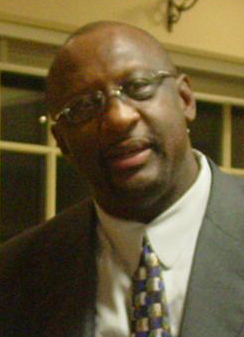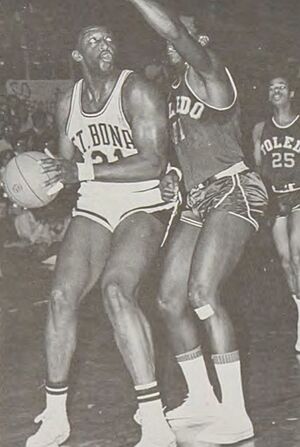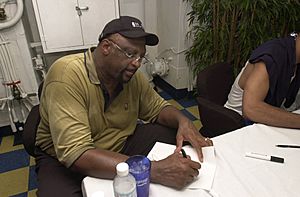Bob Lanier facts for kids

Lanier in 2004
|
|
| Personal information | |
|---|---|
| Born | September 10, 1948 Buffalo, New York, U.S. |
| Died | May 10, 2022 (aged 73) Phoenix, Arizona, U.S. |
| High school | Bennett (Buffalo, New York) |
| Listed height | 6 ft 10 in (2.08 m) |
| Listed weight | 250 lb (113 kg) |
| Career information | |
| College | St. Bonaventure (1967–1970) |
| NBA Draft | 1970 / Round: 1 / Pick: 1st overall |
| Selected by the Detroit Pistons | |
| Pro career | 1970–1984 |
| Career history | |
| As player: | |
| 1970–1980 | Detroit Pistons |
| 1980–1984 | Milwaukee Bucks |
| As coach: | |
| 1994–1995 | Golden State Warriors (assistant) |
| 1995 | Golden State Warriors (interim) |
| Career highlights and awards | |
|
|
| Career statistics | |
| Points | 19,248 (20.1 ppg) |
| Rebounds | 9,698 (10.1 rpg) |
| Blocks | 1,100 (1.5 bpg) |
Robert "Bob" Jerry Lanier Jr. (born September 10, 1948 – died May 10, 2022) was a famous American professional basketball player. He played as a center for the Detroit Pistons and the Milwaukee Bucks in the National Basketball Association (NBA). Bob Lanier was honored by being added to the Naismith Memorial Basketball Hall of Fame in 1992.
During his 14 seasons in the NBA, Lanier was chosen for eight NBA All-Star Games. He was even named the Most Valuable Player (MVP) of the 1974 All-Star Game. He achieved all this despite having many knee injuries throughout his career. Both the Pistons and the Bucks retired his No. 16 jersey, meaning no other player on those teams can wear that number. His No. 31 jersey was also retired by St. Bonaventure University, where he played college basketball. After he stopped playing, he worked as an assistant coach for the Golden State Warriors and was briefly their head coach. Later, he became an NBA Cares Global Ambassador, helping communities around the world.
Contents
Early Life and High School Basketball
Robert Jerry Lanier Jr. was born on September 10, 1948, in Buffalo, New York. His parents were Robert Sr. and Nannette Lanier.
When he was younger, Bob Lanier faced challenges trying to play basketball. At age 11, a coach told him his feet were too big to be a good athlete. Even when he was 6 feet 5 inches (1.96 m) tall at 16, he didn't make the main basketball team at Bennett High School. Coaches thought he was too clumsy.
In his junior year, a new coach, Fred Schwepker, encouraged him to try again. This time, Lanier made the team! He quickly became a star, scoring 21.5 points per game as a junior. He was named to the All-City team. In his senior year, he scored 25.0 points per game and earned All-Western New York State honors. He led Bennett High School to two Buffalo city championships. Lanier graduated in 1966.
Over 100 universities wanted Lanier to play for them. He chose St. Bonaventure University, which was close to his home. Coach Larry Weise said that Lanier picked St. Bonaventure because his parents could easily come to watch him play every game.
College Career Highlights
Lanier was a three-time Converse All-America player from 1968 to 1970. In 1970, as a senior, he led the St. Bonaventure team to the NCAA Final Four. This is a huge achievement in college basketball.
Sadly, he hurt his knee in the regional championship game. This injury meant he couldn't play in the Final Four. St. Bonaventure lost to Jacksonville University, whose team included future Hall of Famer Artis Gilmore. That year, Lanier was named "Player of the Year" by Coach and Athlete Magazine. He also won the "Player of the Year" award for the Eastern College Athletic Conference.
Sophomore Year: An Undefeated Season
As a 6 ft 10 in (2.08 m) sophomore in the 1967–68 season, Lanier made a big impact. He led St. Bonaventure to a perfect regular season, winning all 26 games! The team was ranked No. 3 in the country. Lanier averaged 26.2 points and 15.6 rebounds per game. In one game against Loyola Maryland, he grabbed 27 rebounds.
In the 1968 NCAA Tournament, Lanier led St. Bonaventure to a win over Boston College. However, their undefeated season ended when they lost to North Carolina. Lanier was named second-team All-American that year.
Junior Year: Setting Records
In the 1968–69 season, St. Bonaventure finished with a 17–7 record. Lanier set a school record by scoring 51 points in a single game against Seton Hall. He averaged 27.3 points and 15.6 rebounds per game. He was again named second-team All-American. During this time, he was offered a lot of money to leave college early and play professionally. But he listened to his father's advice and stayed in school.
Senior Year: Final Four and Injury
In his senior year (1969–70), Lanier averaged 29.2 points and 16.0 rebounds. St. Bonaventure had an amazing 25–1 regular season and was ranked No. 3 nationally. Lanier led his team through the 1970 NCAA Tournament to the Final Four.
However, in the regional championship game, he injured his knee. This injury was serious and needed surgery. Because of it, he couldn't play in the Final Four games. St. Bonaventure lost to Jacksonville University and then to New Mexico State.
Even with the injury, Lanier was named first-team All-American. He graduated from St. Bonaventure with a degree in business. He still holds St. Bonaventure records for scoring and rebounding. He averaged 27.6 points and 15.7 rebounds over 75 college games.
Years later, in 2018, St. Bonaventure won its first NCAA Tournament game since 1970. The coach, Mark Schmidt, said the victory was "for him" (Bob Lanier), remembering how Lanier's injury had affected their 1970 team.
Professional Basketball Career
Detroit Pistons: A Star is Born (1970–1980)
Bob Lanier was the very first player picked in the 1970 NBA draft by the Detroit Pistons. He was still recovering from his knee surgery when he joined the team. He was in pain and not in the best shape.
Despite this, Lanier quickly became a star. He was named to the 1971 NBA All-Rookie Team. He averaged 15.6 points and 8.1 rebounds in his first year. He later said he probably shouldn't have played that first year because of his knee. But he worked hard to get better.
Lanier became a key player for Detroit. For eight seasons, he averaged over 21 points per game. In the 1971–72 season, he scored a career-high 25.7 points per game. He also grabbed over 11 rebounds per game for seven straight seasons. He was chosen for seven All-Star games while with the Pistons. In the 1974 All-Star Game, he scored 24 points and was named the MVP.
His later years in Detroit were tough because of his knee injuries. He often missed games. The Pistons team also changed coaches very often, which made it hard to build a strong team.
In his ten seasons with the Detroit Pistons, Lanier averaged 22.7 points and 11.8 rebounds per game. He is the Pistons' all-time leader in scoring average. He is also second in total rebounds and third in total points for the team.
Milwaukee Bucks: A New Chapter (1980–1984)
In 1980, Lanier was traded to the Milwaukee Bucks. He was happy about the trade because he wanted a fresh start. The fans in Milwaukee welcomed him warmly.
With the Bucks, Lanier played alongside other great players like Marques Johnson and Sidney Moncrief. The Bucks won their division championship every year he was there. Even with his aging knees, Lanier was a very important player for the team. He played about 10 minutes less per game than he did in Detroit, which helped him manage his injuries.
Lanier retired from the Milwaukee Bucks in 1984 due to his knee injuries. In his five seasons with the Bucks, he averaged 13.5 points and 5.9 rebounds per game. He played in the 1982 All-Star Game with Milwaukee. The Bucks made it to the Eastern Conference Finals twice during his time there.
NBA Career Summary
Over his 14-season career, Bob Lanier played in 959 games. He averaged 20.1 points, 10.1 rebounds, 3.1 assists, 1.5 blocks, and 1.1 steals per game. He scored a total of 19,248 points and had 9,698 total rebounds. He played in 67 playoff games.
Hall of Famer Willis Reed once said that Bob Lanier was "probably one of the best all-around big men ever to play the game of basketball." Lanier was known for being a tough and physical player on the court.
Coaching and Community Work
After his playing career, Lanier became an assistant coach for the Golden State Warriors in 1994. His former coach, Don Nelson, was the head coach. In 1995, Lanier briefly took over as the interim head coach for 37 games.
Beyond basketball, Lanier was very active in community service. He owned his own marketing company. From 1989 to 1994, he was a spokesperson and chairman for the NBA's "Stay In School" program, which later became "Read to Achieve."
From 2005 until his death in 2022, Lanier was the NBA Cares Global Ambassador. In this role, he worked with many youth programs. These programs focused on education, helping young people and families, and health.
In Popular Culture
Bob Lanier appeared in the basketball movie The Fish That Saved Pittsburgh in 1979. He was part of the Detroit team in the film.
In the famous comedy movie Airplane! (1980), basketball legend Kareem Abdul-Jabbar jokingly mentions Lanier. He says, "Tell your old man to drag [Bill] Walton and Lanier up and down the court for 48 minutes."
Personal Life and Legacy
Bob Lanier was married twice and had five children: Walter “Jack” Lanier, Kimberly Lanier, Tiffany Lanier, Robert Lanier III, and Khalia Lanier. He also had seven grandchildren.
The knee injuries he had during his playing career continued to bother him as he got older. He had several surgeries after he retired, with the last one in 2017.
At the Naismith Memorial Basketball Hall of Fame in Springfield, Massachusetts, visitors can compare their foot size to Lanier's. He had very large feet! The biggest shoe ever made by the company Allen Edmonds was a size 22, made just for him.
In 2018, Lanier shared a special memory. While getting gas, a man asked him to visit his sick father, who was a big fan. Lanier went and spent a moment with the man's father, who smiled and squeezed his hand. A couple of weeks later, the father passed away. His son left a thank-you card, saying Lanier had made his dad's last days good.
Bob Lanier passed away on May 10, 2022, at the age of 73, after a short illness.
Honors and Awards
Bob Lanier received many honors throughout his life:
- In 1975, he was inducted into the St. Bonaventure Athletics Hall of Fame.
- St. Bonaventure retired his No. 31 jersey.
- In 1978, he received the J. Walter Kennedy Citizenship Award for his amazing community service.
- The YMCA gave him the "Jackie Robinson Award" in 1981 for his service to youth and leadership.
- He was inducted into the Greater Buffalo Sports Hall of Fame in 1991.
- Both the Detroit Pistons and Milwaukee Bucks retired his No. 16 jersey.
- In 1992, Lanier was enshrined into the Naismith Basketball Hall of Fame.
- He received the Congressional "Horizon & Leadership Award" in 2000 for his impact on young people.
- In 2006, Lanier was inducted into the College Basketball Hall of Fame.
- He received the National Civil Rights Museum Sports Legacy Award in 2007 for his work in civil and human rights.
- In 2007, the basketball court at St. Bonaventure, his college, was named "Bob Lanier Court" in his honor.
- In 2009, he received "The Mannie Jackson – Basketball's Human Spirit Award" for his passion for basketball and community service.
NBA Career Statistics
| Legend | |||||
|---|---|---|---|---|---|
| GP | Games played | GS | Games started | MPG | Minutes per game |
| FG% | Field goal percentage | 3P% | 3-point field goal percentage | FT% | Free throw percentage |
| RPG | Rebounds per game | APG | Assists per game | SPG | Steals per game |
| BPG | Blocks per game | PPG | Points per game | Bold | Career high |
Regular Season Stats
| Year | Team | GP | GS | MPG | FG% | 3P% | FT% | RPG | APG | SPG | BPG | PPG |
|---|---|---|---|---|---|---|---|---|---|---|---|---|
| 1970–71 | Detroit | 82 | — | 24.6 | .455 | — | .726 | 8.1 | 1.8 | — | — | 15.6 |
| 1971–72 | Detroit | 80 | — | 38.7 | .493 | — | .768 | 14.2 | 3.1 | — | — | 25.7 |
| 1972–73 | Detroit | 81 | — | 38.9 | .490 | — | .773 | 14.9 | 3.2 | — | — | 23.8 |
| 1973–74 | Detroit | 81 | — | 37.6 | .504 | — | .797 | 13.3 | 4.2 | 1.4 | 3.0 | 22.5 |
| 1974–75 | Detroit | 76 | — | 39.3 | .510 | — | .802 | 12.0 | 4.6 | 1.0 | 2.3 | 24.0 |
| 1975–76 | Detroit | 64 | — | 36.9 | .532 | — | .768 | 11.7 | 3.4 | 1.2 | 1.3 | 21.3 |
| 1976–77 | Detroit | 64 | — | 38.2 | .534 | — | .818 | 11.6 | 3.3 | 1.1 | 2.0 | 25.3 |
| 1977–78 | Detroit | 63 | — | 36.7 | .537 | — | .772 | 11.3 | 3.4 | 1.3 | 1.5 | 24.5 |
| 1978–79 | Detroit | 53 | — | 34.6 | .515 | — | .749 | 9.3 | 2.6 | .9 | 1.4 | 23.6 |
| 1979–80 | Detroit | 37 | — | 37.6 | .546 | .000 | .781 | 10.1 | 3.3 | 1.0 | 1.6 | 21.7 |
| 1979–80 | Milwaukee | 26 | — | 28.4 | .519 | 1.000 | .785 | 6.9 | 2.4 | 1.4 | 1.1 | 15.7 |
| 1980–81 | Milwaukee | 67 | — | 26.2 | .525 | 1.000 | .751 | 6.2 | 2.7 | 1.1 | 1.2 | 14.3 |
| 1981–82 | Milwaukee | 74 | 72 | 26.8 | .558 | .000 | .752 | 5.2 | 3.0 | 1.0 | .8 | 13.5 |
| 1982–83 | Milwaukee | 39 | 35 | 25.1 | .491 | .000 | .684 | 5.1 | 2.7 | .9 | .6 | 10.7 |
| 1983–84 | Milwaukee | 72 | 72 | 27.9 | .572 | .000 | .708 | 6.3 | 2.6 | .8 | .7 | 13.6 |
| Career | 959 | — | 33.5 | .514 | .154 | .767 | 10.1 | 3.1 | 1.1 | 1.5 | 20.1 | |
| All-Star | 8 | 0 | 15.1 | .582 | — | .833 | 5.6 | 1.5 | .5 | .6 | 9.2 | |
Playoff Stats
| Year | Team | GP | GS | MPG | FG% | 3P% | FT% | RPG | APG | SPG | BPG | PPG |
|---|---|---|---|---|---|---|---|---|---|---|---|---|
| 1974 | Detroit | 7 | — | 43.3 | .507 | — | .789 | 15.3 | 3.0 | .6 | 2.0 | 26.3 |
| 1975 | Detroit | 3 | — | 42.7 | .510 | — | .750 | 10.7 | 6.3 | 1.3 | 4.0 | 20.3 |
| 1976 | Detroit | 9 | — | 39.9 | .552 | — | .900 | 12.7 | 3.3 | .9 | 2.3 | 26.1 |
| 1977 | Detroit | 3 | — | 39.3 | .630 | — | .842 | 16.7 | 2.0 | 1.0 | 2.3 | 28.0 |
| 1980 | Milwaukee | 7 | — | 36.6 | .515 | — | .738 | 9.3 | 4.4 | 1.0 | 1.1 | 19.3 |
| 1981 | Milwaukee | 7 | — | 33.7 | .588 | — | .719 | 7.4 | 4.0 | 1.7 | 1.1 | 17.6 |
| 1982 | Milwaukee | 6 | — | 35.3 | .513 | .000 | .560 | 7.5 | 3.7 | 1.3 | .8 | 16.0 |
| 1983 | Milwaukee | 9 | — | 27.8 | .573 | — | .600 | 7.0 | 2.6 | .6 | 1.6 | 13.7 |
| 1984 | Milwaukee | 16 | — | 31.2 | .480 | — | .886 | 7.3 | 3.4 | .7 | .6 | 12.7 |
| Career | 67 | — | 35.2 | .532 | .000 | .768 | 9.6 | 3.5 | .9 | 1.5 | 18.6 | |
| Source: | ||||||||||||
See also
 In Spanish: Bob Lanier para niños
In Spanish: Bob Lanier para niños
 | Selma Burke |
 | Pauline Powell Burns |
 | Frederick J. Brown |
 | Robert Blackburn |



